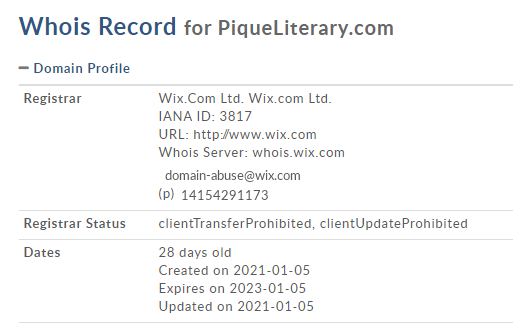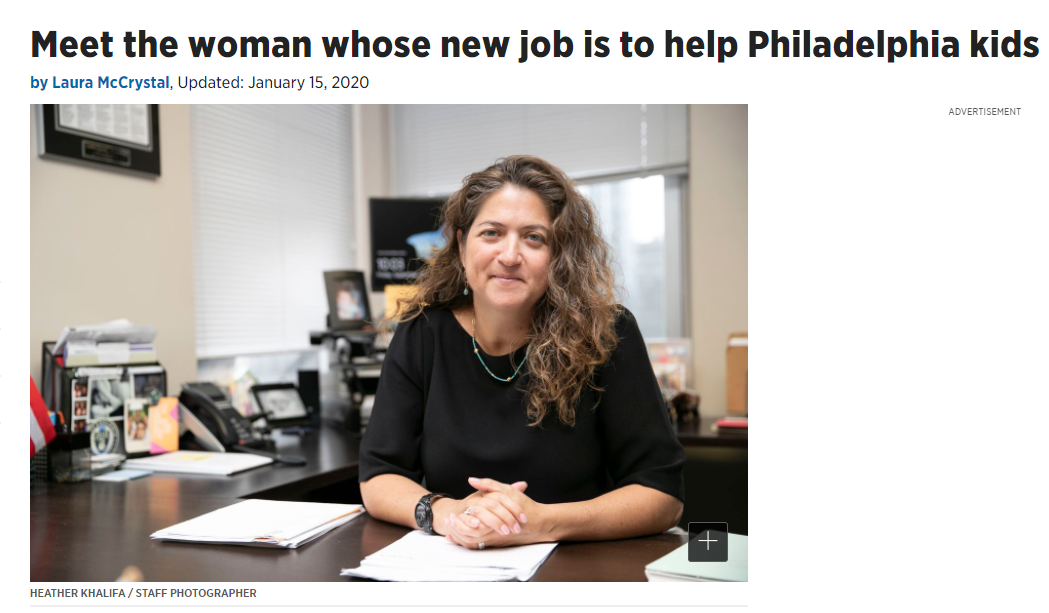
This is an expanded version of a Twitter thread I published last weekend–but not everyone is on Twitter and there have been new developments, so I’m amplifying it here.
You’ll find this post useful not just as an amusing account of unmasking a fraud, but as a series of tips on what should ring warning bells when you’re evaluating an agency’s website.
******
On Sunday morning, an alert writer DM’d me about a new agency promoting itself on Twitter: Pique Literary.
That caught my attention: reputable agents don’t charge upfront fees. So I looked into it. Spoiler: Pique Literary no longer exists, so I can’t provide any links, just screenshots.
Pique gets props for spelling “pique” correctly. But the administration fee was only the beginning of the red flags I found.
1. The fee.
Only £10 ($14 US) but as noted, reputable agents/agencies don’t charge such fees, and they are always a red flag. Even if small, they can represent a considerable income stream for a busy agency, and can be an incentive to rake in as many submissions as possible, even if the agents aren’t actually interested in the manuscripts.
Bonus red flag: Pique’s bizarre rationalization of the fee. This is from the FAQ page.
As absurd as this is, it’s also a rather clever spin. Yes, you have to give us cash, but we aren’t trying to make money here–in fact it’s TOTALLY IN YOUR INTEREST because it will help us give your deathless prose the attention it deserves! And guess what! Paying us isn’t just helping you, it’s helping hungry people! Which local food bank was that again? Never mind.
2. Agent bios that either didn’t cite any publishing or agenting experience, or made vague claims that could not be verified.
Agent names and biographies are definitely something you want to see on an agency website–they make it possible to assess the agents’ competence and experience. “Agent” is not an entry-level job: it’s a skilled profession that requires specialized knowledge (of publishing contract terms, for instance) and contacts within the publishing industry.
Previous positions in publishing, or working or training with another (reputable) agency: this is the kind of resume you want an agent to have. People who come to agenting without that professional background are at a significant disadvantage…which means that, as a client, you will be too. Be wary also of non-specific claims like “Agent X has worked for multiple publishing houses” or “Agent Y interned with a successful agency”. Anyone can make such statements, whether they’re true or not–or whether the publishers or agencies are reputable or not.
In all three of the Pique agent bios above, you can see this sort of vagueness at work. No experience mentioned, or experience mentioned but impossible to confirm due to the lack of details. Also, Daniel’s and James’s photos look awfully headshotty for a small agency website. I ran all of them through an image search, which turned up nothing (more on that below).
3. Other than the Pique website, not one of the Pique agents–including founder Paula Wellington–had any internet presence.
Zero on a websearch. Zilch on Publishers Marketplace or QueryTracker–two excellent sources of agent information. If an agent has made sales, there should be some trace of them on the internet. Not all agents/agencies have super-high web profiles, and a brand-new agent still building their client list may not have much web presence. But for an entire agency’s staff to turn up empty on a search is definitely suspicious.
4. No client list, no mention of sales.
Who an agent/agency represents, and what–and where–they have sold are really important, not just for assessing the agent/agency’s competence and standing, but for evaluating whether it’s the right agent/agency for you. Where an agent or agency has placed books is a good predictor of where they will place them; if your goal is one of the big houses, a track record of placements mostly with small presses probably isn’t a good fit (especially if those presses primarily work directly with authors: you hire an agent to get you through doors you can’t open on your own, not to approach publishers you could have submitted to yourself.)
Most reputable agencies prominently feature client and especially sales information. It’s a form of advertising.
New agencies may still be chasing clients and sales. So a new agency’s lack of sales–assuming it really is new and not just pretending (see Red Flag #5)–isn’t necessarily a warning sign, especially if the agents have the right background and experience. But there should at least be some indication of whom they’re representing. The complete absence of any of this information on Pique’s website is another red flag.
5. Pique did appear to be new–at least, judging by its domain registration. But was it?
According to Pique’s domain registration, it was less than a month old.
Yet throughout the Pique website, there were references to “restructuring”, “rebranding”, and “working through the pandemic” (see the first image above, also the rationale for the administration fee), and the agents’ bios mentioned clients–all of which would seem to indicate an agency that had been in operation for months, if not longer. Could it have been operating under a different name? If so, that information wasn’t present anywhere. Why not?
This kind of conflict/confusion is another red flag. It also points up the importance of trying to verify what an agency says about itself.
6. A curious lack of transparency around the agency’s origins and history.
Not all reputable agencies provide detailed histories, but if they do, they shouldn’t suggest that there is something to hide.
Founder Paula Wellington did address the agency’s background in her bio, which was as specifics-challenged as those of her fellow agents:
Which agency did she start working with in 2006? What was the name of the “small agency” she founded in 2009? How did it “evolve” into Pique (apparently less than four weeks ago)? There’s no reason not to provide this information…unless there’s something you’d rather not say. Some sort of controversy or scandal or legal trouble, for instance. Or a terrible track record.
Or maybe you’re just lying.
******
As mentioned, I posted most of this as a Twitter thread. Shortly after I did, Twitter detectives went to work.
Suspecting a stolen or stock image, I’d run an image search on the Pique agent photos, but turned up nothing. Smarter people than me figured out why: at least two of the images had indeed been stolen–but they had also been reversed, manipulated, and treated with a black-and-white filter in order to foil search engines.
Agent Marta’s photo actually belongs to book YouTuber The Book Leo.
And Founder Paula’s photo is actually Cynthia Figueroa, featured in a recent news article about her appointment as Philadelphia’s new deputy mayor for children and families.
In other words, Pique Literary had moved out of the realm of “sketchy agency you maybe want to avoid” and into the land of “outright fraud”.
Just a couple of hours after being exposed online, Fake Founder Paula vanished.
Minutes later, so did Pique’s website:
You couldn’t ask for a more compelling admission of a scam.
******
So what was Pique’s endgame? Whoever was behind it went to quite a bit of trouble to create a fictitious website, manipulate stolen photos, etc.–though in the end, they didn’t do enough to withstand a close look.
Perhaps they intended to sit back and collect the admin fees. £10 doesn’t seem like a lot, but for a busy agency receiving 50 or 100 queries a week, it could create a nice income stream. A one-person operation could easily impersonate four agents, using fake email addresses and canned responses, putting clients off with delays, excuses, and fictitious submissions. Or who knows, maybe they really would have made submissions, and even managed to place a few books with smaller publishers. That would just have been gravy, enabling the scam to last a bit longer than it otherwise might have.
Or did Pique intend to steal manuscripts? Theft is a huge fear, especially for aspiring writers, but while you can never say never in the publishing biz, it really is extremely rare–at least, before a work is published. Even scammers almost never do this, mostly because it’s way more trouble to steal someone’s manuscript and pretend it was written by someone else than simply to con the writer directly.
On the other hand, there is a thriving niche in the self-publishing world of people who pay cheap ghostwriters to create books that they then publish under their own names (this niche is largely invisible but occasionally bursts into view, usually not for happy reasons). It’s conceivable that Pique could have planned to make additional money by selling manuscripts on to dishonest ghostwriters who ply their trade on Fiverr and similar sites.
Regardless, we’ll never know–and really that’s a good thing. For anyone who paid the admin fee, I encourage them to file a dispute with their credit card company or PayPal to get their money back.
Most sketchy agencies won’t turn out to be actual scams–they may simply be amateur, marginal, or delusional. But in terms of time-wasting and career damage, the bottom line can be pretty similar, whether you sign up with an agent who hasn’t the skills to perform or an agent who is only interested in how much money they can cheat you into handing over. That’s why, when a new agency comes along, or you discover an existing one you haven’t heard of, it’s so important to evaluate it as critically–and dispassionately–as you can.
The red flags I’ve identified above should help. And, as always, you can message or email me to find out if I’ve heard anything.















Great work, Ms Strauss. A true service to the writers and to publishers.
Great article with valuable advice for authors looking to avoid being scammed!
widdershins–I know, right? That's what I was expecting. Those doctored photos were the kiss of death, though.
There are scammers everywhere. Real agents dint change.
Well, what sort of scam agency are they when they quit so easily, without really trying to blackmail or threaten or bully you, Victoria? /s
Congratulations on send this POS back to the pond scum where they belong. 🙂